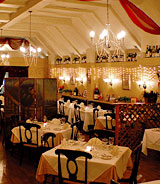
Flavor: French, with global fusion flavors
Ambiance: Romantic setting in a well-lit, historic building
Service: Good
If you’ve spent enough time around foodies, farmers, wine-lovers or devotees of artisanal edibles, you may have heard of the Slow Food movement – a loose-knit international association started in Italy in the 1980s that touts the benefits of all things antithetical to the fast-food model. It teaches the value of enjoying a lovingly cooked meal at a table with friends, revels in the benefits of locally, organically grown produce, and savors the quality of artisanal breads and cheeses, among other things. The movement brings back into focus an age-old concept that has only recently (historically speaking) been challenged by an increasingly fast-paced life that engenders unhealthy habits like wolfing down Big Macs while hurtling down the highway to the next appointment.
The movement has been steadily gaining ground around the world, and Asheville has its very own Slow Food chapter – or, as it’s known in the Slow Food world, convivium – that was founded in 2003.
Kathy and Joe LaMarca, owners of the Left Bank, were part of the movement before they even knew there was a Slow Food organization. “When I first started reading about the Slow Food movement,” Kathy remembers, “Joe and I started laughing, [saying] ‘Wow, we do that already!'”
The Left Bank has been a Patton Avenue staple for the better part of a decade. The restaurant focuses mainly on French cuisine and French techniques, which comprise a large amount of Joe’s culinary background, though he credits his chefs, especially current head chef James King – who’s recently developed a revamped menu – with helping to keep him abreast of current trends in the industry and adding a world of flavors to the mix.
“‘Updated classics’ is a way of saying what we do,” Joe says. “I’m old school. I’m from the old, classic ‘do-it-this-way-or-I’ll-kill-you’ kind of thing. The new chefs that we’ve had are really exciting – they’re up on all the new things that are going on, what’s up-to-date, popular, like the new American-bistro style. I think it’s a nice mix – I’m anchored in the old ways, and they’re very excited in new things.”
The Left Bank and the LaMarcas embody the old-ways spirit of Slow Food. They make several varieties of goat cheese – including chevre, feta and ricotta – from scratch, incorporating milk from the goats they raise on their farm in Barnardsville, where they also grow some of the produce, culinary herbs and edible flowers that find their way onto the table at the restaurant.
Making the cheeses is an elaborate process that points up the challenges of going the slow-food route. First, the couple imports cultures and molds from France. Then, things get “tricky,” as Joe puts it, mentioning a goat’s-milk blue cheese that the couple is experimenting with. “It needs a constant humidity and a constant temperature, and it takes two months, so you don’t know if you’ve done it right until two months later, then you discover that you’ve messed something up.”
The LaMarcas bought a wine cooler to help with the ripening process of the blue, and they’re currently perfecting a Romano-like hard cheese made with goat’s milk that takes about five or six months to age (talk about “slow food”).
Joe, a French-American (though you would never guess it from his accent, which is heavily influenced from many years working in Big Apple kitchens) who has been a chef for more than 30 years, says he likes the patient approach, and wouldn’t have his food any other way.
“French cuisine begins with slow processes,” he explains. “We make all of our own stocks – veal stock, fish stock, chicken stock, duck stock, lamb stock – all of our sauces are reduced from those stocks. You know, it takes 48 hours just to start the stock, then you strain it, then reduce it even more until it coats the back of a spoon – that’s called proper glaçage. … We make our own seasoning blends – curries, blackening spice, etcetera, and we make all our own desserts from scratch, too.
Breads are made in-house using eggs from the Rhode Island Red chickens the couple raises on their farm, eggs Kathy praises for their bright-orange color. The LeMarcas also grow several types of edible flowers, including nasturtiums, violas, wisterias and dandelions.
“The customers love that – to hear that a lot of things come from the farm,” Kathy says. “It just adds another dimension to their dining experience.
“I have this urge to get back to the earth and get back to things that are natural, as someone who has studied herbalism,” she continues. “I see what our fast life and what pharmaceuticals and food additives have done to people’s health. And coming from someone who’s both a restaurateur who’s into the Slow Food idea, and from the aspect of an herbalist, I think that it’s the only way to go.”
“I do feel that people should get back to the earth,” Joe adds. “Everyone used to have their plots where they grew at least some of their own vegetables, and no one does that anymore, or at least it’s not as prevalent as it used to be. Plus, no one knows – with the incidence of cancer being as high as it’s ever been – no one really knows if it’s the chemicals and the pesticides that they’re using. I feel like we should get back to natural organic farming.”
The Left Bank’s new chef, King, shares the LaMarcas’ perspective on the pace of growing, preparing and consuming food. “When you start working with your food from the ground up, you tend to respect it,” he notes. “And that brings a lot to human relations as well. When you walk into a place and [grab your food] and go, you miss the whole point.”



God,whatever happened to that handsome, brown-eyed TODD ?